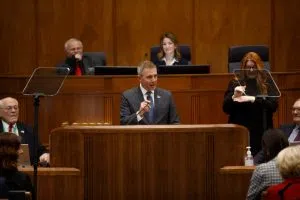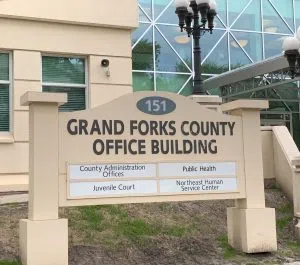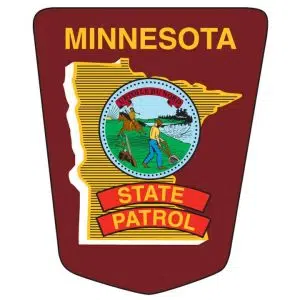 (Michael Achterling – Amy Dalrymple – Jeff Beach -North Dakota Monitor) –
(Michael Achterling – Amy Dalrymple – Jeff Beach -North Dakota Monitor) –
North Dakota Gov. Kelly Armstrong unveiled a plan Tuesday that aims to eliminate property taxes for most homeowners within a decade.
In his first State of the State address, the Republican also signaled support for education savings accounts and public charter schools, pledged to address overcrowded prisons and jails and committed to prioritizing behavioral health services.
Reforming property taxes ought to be the Legislature’s first priority, Armstrong said, to ensure home ownership remains affordable. Key points of his plan include:
- Increasing the primary residence tax credit from $500 a year to up to $1,550 for the first year.
- Funding the program with Legacy Fund earnings. As the fund grows, homeowners would see larger refunds each year, putting most homeowners on a path toward zero property taxes within a decade.
- Establishing a 3% annual cap on local property tax budgets. The cap applies to all types of property, not just residential.
- Cities, counties, schools and park districts could carry over unused increases for up to five years in order to plan for larger projects.
Armstrong addressed pushback the caps are likely to receive from local government leaders.
“And to those who say the state shouldn’t be capping local budgets, when this package is approved, the state will be paying for over 50% of the local share of property taxes,” Armstrong said. “We absolutely have a say in their budget growth.”
The proposal follows a citizen-led effort that sought to eliminate all property taxes based on assessed value. Although voters rejected the ballot measure in November, they have continued to complain about property taxes being too high.
“Recognizing the frustration of our constituents and using the expertise and background of our legislators, we are offering the most aggressive, durable and responsible plan to reduce property taxes that has ever been proposed,” Armstrong said.
Lawmaker reaction
Rep. Craig Headland, R-Montpelier, chair of the House Finance and Taxation Committee, called Armstrong’s property plan a “great start.”
Headland said he doesn’t know if a 3% local property tax cap will be in the final legislation, but his committee will begin to iron out the details.
The North Dakota Association of Counties has traditionally opposed capping property taxes, citing concerns that the limits infringe on local government.
Aaron Birst, executive director, said being able to carry over unused increases “seems to be moving in the right direction.”
“I’m interested in exploring how that could be done,” Birst said.
Rep. Scott Louser, R-Minot, who also has been working on a property tax reform bill, said he has sensed momentum building for property tax caps.
“What this does is encourage prudent spending,” Louser said.
Sen. Josh Boschee, D-Fargo, assistant Senate minority leader, called Armstrong’s property tax proposal “progressive.” Boschee, a real estate agent, said he’s pleased the plan would eliminate the need for homeowners to apply every year.

Education
Armstrong, who will deliver his budget recommendations next week, said he supports education savings accounts, which he described as funding set aside for students to go toward services or tuition at public, private or homeschool.
“The money follows the students, not the school, ensuring every student has the tools they need to prepare for college, a career or the military,” Armstrong said.
He also said he supports creating public charter schools with the same performance standards as public K-12 schools.
“This policy change will create another choice for families when selecting the learning environment they feel is best suited for their child’s needs,” Armstrong said.
Armstrong commended the Legislature’s investment in Career and Technical Education and called the North Dakota University System the state’s greatest recruitment tool. He called on the state’s public colleges and universities campuses to adapt to changing demographics and learning models.
“We need to stop talking about closing campuses and refocus on how to make our institutions more responsive to our workforce needs,” Armstrong said.
Nick Archuleta, executive director of North Dakota United, which represents public educators, said his group is not opposed to funding that follows the student as long as it is new money that doesn’t come out of the K-12 education budget.
Louser, who also is a Minot school board member, said he expects several school choice bills to be introduced. He said it will be a challenge to sort through the various proposals.
“I wouldn’t say it’s controversial, but it will be confusing,” he said.

Corrections, behavioral health
Armstrong said the state needs an “immediate solution” to address overcrowding in state prisons and county jails. He said he plans to announce next week a “tangible, turnkey solution” to address the overcrowding.
He also called for a new approach to corrections.
“Finding practical solutions that will increase access to services while reducing the reliance on our jails and prisons as treatment centers is a top priority of our administration,” Armstrong said.
He announced the creation of a new governor’s Cabinet position, the Commissioner of Recovery and Re-Entry.
He said he wants to build on the work of former first lady Kathryn Burgum’s efforts to end the stigma around the disease of addiction. Armstrong appointed Jonathan Holth, who is in long-term recovery and recently served as director of Recovery Reinvented during the Gov. Doug Burgum administration.
The goal of the position will be to bring together the Department of Corrections and Rehabilitation, county jails, law enforcement, judicial system, tribal partners and addiction counselors.
“We have to take an all-of-government approach to these challenges,” Armstrong said.
Energy, agriculture
Armstrong, who didn’t seek reelection to the U.S. House in order to run for governor, expressed a commitment to push back against federal regulations that affect energy and agriculture, North Dakota’s top industries.
“We owe it to our farmers, ranchers and energy producers to engage in this fight,” Armstrong said. “We owe it to our citizens to defend our way of life.”
He called for policies that promote using carbon dioxide to enhance oil recovery in the Bakken. He also said the state should work with the pipeline industry to improve transportation of natural gas.
Streamlining government
Armstrong said he supports streamlining state government, calling attention to 154 different state boards and commissions. He said he’s working with lawmakers on a bill that would analyze all boards and recommend some for combination or elimination.
Armstrong said he signed an executive order Tuesday that dissolves five boards. Most had either not met in a year or had completed their work, such as a task force on the 2020 Census.
Workforce
Throughout his speech, Armstrong made references to addressing North Dakota’s workforce challenges, emphasizing policies that make the state “the best place to live, work and raise a family.”
“We are not the biggest state. We don’t claim to be and we don’t want to be,” he said. “But the people of North Dakota have big hearts and big ideas, and we have always had the courage to try new things.”









